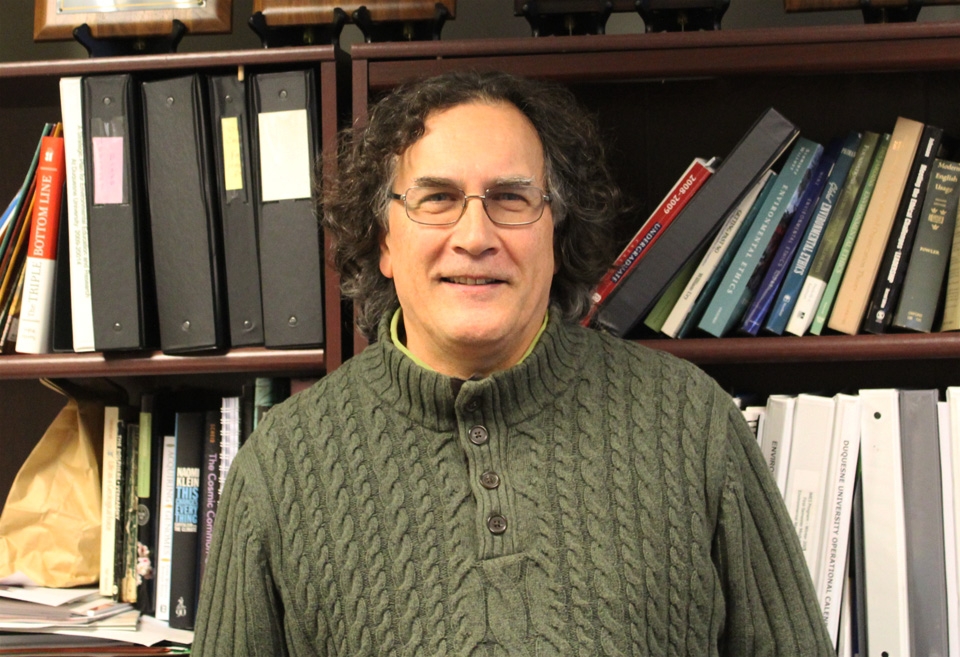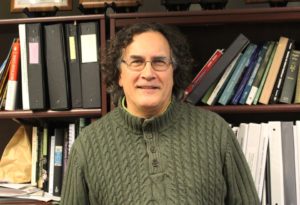

By Brittney Jackson | Contributor
Since 1990, when John Stolz left Boston to pursue a career as Assistant Professor at Duquesne University, no one could fathom the incredible impact he would have on Duquesne students. Over the past twenty-six years, Stolz has held different academic positions before becoming the Director for the Center of Environmental Research and Education (CERE) in 2009.
His most notable effect on students include a growing number of environmental science majors. Last year alone, CERE witnessed a 25 percent increase in environmental science majors. More environmental science and management graduate students now opt to pursue research theses, as opposed to the internship route. Even more environmental science undergraduate students are choosing to participate in research, even though research is not necessary for their graduation.
Lisa Mikolajek Barton, CERE Program Coordinator, attributed the uptick in students engaging in research to Stolz’s passion. She said a tremendous amount of administrative duties keeps Stolz busy; however, he always allocates time for the growing number of enthusiastic researchers in his lab. Barton observed that, rather than being distracted by these duties, Stolz only grew more prolific and successful in his research.
Many students feel grateful for the guidance Stolz provided them with during their education at Duquesne. Jenna Kuhn said Stolz took her under his wing during her first summer participating in the Undergraduate Research Program.
“He was so welcoming and inspiring to be around and talk to, which made it so easy to get involved in the EMS program,” Kuhn said.
Tyler Umstead, a recent graduate, said research was stressful at times because Stolz knew Umstead’s potential and expected him to perform accordingly.
“He has brought out the best of my talents, and he has been a great academic advisor and friend,” Umstead said.
Linnea Manley initially wanted to follow the internship path, but changed her mind when Stolz offered her the opportunity to become a graduate research assistant.
“While working with Dr. Stolz, I am not just creating a piece of writing but actually making a contribution to science and, hopefully, to Southwestern Pennsylvania,” Manley said.
Barton said that, since becoming director, Stolz has injected copious amounts of energy into CERE.
“One morning, he was moving through the office so fast he created a blast of wind that knocked over one of our plants,” Barton said. “I have never seen exactly how he does it, but I am sure he sometimes gets from Mellon Hall to Fisher Hall in about 90 seconds flat.”
In addition to inspiring students to perform challenging research, Stolz has achieved many accolades over the past eight years. Some of these achievements include induction into the Duquesne University Office of Research Hall of Fame in 2010, obtaining grant funding from multiple organizations to organize a symposium on shale gas extraction in 2013, earning the Duquesne University President’s Award for Excellence in Service to the Mission in 2014 and receiving the Noble J. Dick Endowed Chair in Community Outreach in 2015.
I can personally attest to how Stolz can have a monumental impact a student’s life. With Stolz’s help, I became Duquesne’s first EPA GRO Fellow, a research award only granted to approximately thirty undergraduates each year. As the environmental science program at Duquesne approaches its 25th anniversary next year, Stolz deserves recognition for impacting students’ lives through his inspiration to pursue research. Congratulations Stolz, and thanks.




